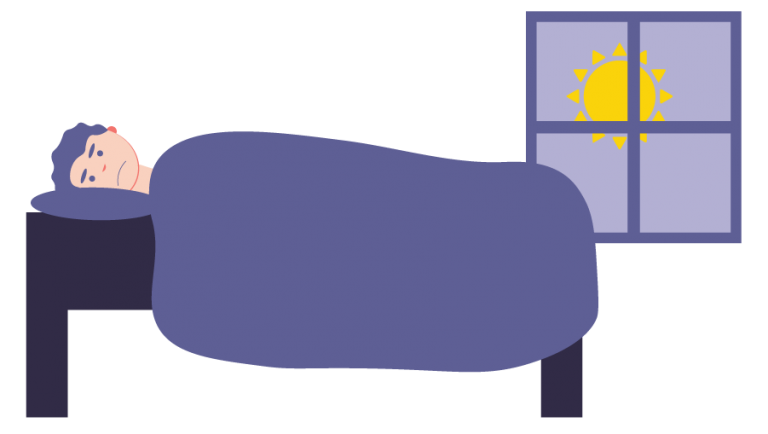UNDERSTANDING INSOMNIA

WHAT IS
CHRONIC INSOMNIA?
CHRONIC INSOMNIA involves difficulty falling asleep, not being able to fall back to sleep if you wake at night, waking up too early or not feeling rested from sleep – occurring at least 3 nights a week and lasting for 3 months or more.
WHAT IS NOT
CHRONIC INSOMNIA?
• Sleep problems affect 1 in 3 of us, but they don’t need to last for long
• Taking 10-30 minutes to fall asleep is typical
• It is normal to have brief periods of waking during the night, as adults move through the 4 stages of sleep – going through light sleep, deep sleep and REM sleep – in repeating 90-minute cycles
WHAT IS THE CAUSE OF INSOMNIA?
Insomnia is a complex disorder with many possible underlying reasons:
- Any major life change (job change, marriage, moving)
- A traumatic event (death in the family, a major health issue)
- Insomnia may be the first sign of anxiety and depression
- Various medical conditions, like thyroid problems, can cause insomnia
- Sleep disorders like sleep apnea (narrowing in the airway during sleep) or restless legs (an uncomfortable feeling in the legs in the evening hours or during sleep) can keep you awake

HOW DO YOU IMPROVE INSOMNIA?
Only use the bed for sleep and sex – if you are struggling to sleep, get out of bed and do something relaxing until you are sleepy and then get back in bed without trying to sleep.
Do not try to sleep – Sometimes, the harder you try to sleep, the more difficult it becomes. In fact, lying in bed awake can contribute to sleeplessness by creating an unhealthy association between your bedroom and being awake. This is why it is important to get out of bed if you are not sleeping.
Maintain a regular sleep schedule – Keep a regular wake-up time. Follow your weekday schedule, even into the weekend, to avoid “social jet lag.” Get bright light in the morning.
Avoid regular daytime naps – Especially if they are longer than 20 to 30 minutes, occur late in the day and/or disrupt your sleep at night
Do not look at the clock – If you need an alarm clock, make it dimly lit or turn it around.
Allow enough time for sleep – Sleep as long as necessary to feel rested (usually 7-8 hours for adults) and then get out of bed without lingering in bed awake for long periods of time.
Have a “wind down period” at least 30- 60 minutes before bed – Using blue light-emitting screens before bedtime delays the release of melatonin, making our brains think it is still daytime. So, it is best to turn off these devices and develop a screen-free routine involving reading, puzzles, a bath or other relaxing activity. Alternatively, some screens have a setting to block-out the blue light or you can use inexpensive blue-blocker sunglasses.
Make you bedroom your sanctuary – A bedroom is just that, a room with a bed: Keep television, radio and smart phones out of the bedroom or at least turned off, keep the room dark, quiet and cool.
Avoid things that disrupt sleep – No caffeine after midday and avoid alcohol after dinner. Avoid smoking in the evening or using recreational chemicals. Right before bed avoid having a large meal, drinking too much liquid or exercising if these actions make sleep difficult for you.
Exercise regularly – For at least 20 minutes at day, preferably more than four to five hours prior to bedtime
Coping with mood issues – like anxiety and depression, through exercise, relaxation, or counseling
NEXT STEPS TO TRY
If you have been diagnosed with insomnia, other causes have been ruled out, and you have tried the above tips and still struggle to sleep, behavioral therapy for insomnia is very effective. This treatment involves a deep-dive into your sleep pattern, keeping a sleep diary and having weekly sessions with a sleep specialist who will provide you with tools and strategies to adjust your behavior around your sleep schedule.
While working with a specialist is preferred, you may be unable to attend weekly visits, so you can consider using an app (CBT-i Coach) or online (Go! to Sleep Program) resource.
WHAT ABOUT MEDICATIONS?
MELATONIN, CBD, VALERIAN ROOT or CHAMOMILE – There is not a lot of evidence that these products are useful for insomnia. If they work, it is fine for adults to use them at reasonable doses. Melatonin can be taken safely in doses of 2-3 mg or less, preferably a few hours before sleep, when the body naturally produces this hormone. It can also be taken at bedtime.
If you decide to take these products and they cause morning drowsiness, cut back on the dose or stop taking them.
OVER-THE-COUNTER SLEEP AIDS – Many of these products contain diphenhydramine and while this works well if you are going to use it a few times a month, nightly use is not a good idea. This can lead to more daytime tiredness and dry out your body, especially if you are an older adult.
PRESCRIPTION SLEEP AIDS – In some situations, prescription sleep aids can be helpful. Talk to your primary care doctor or a sleep provider about whether or not this makes sense for you.


Take the “4 Week Sleep Challenge” to learn more about your sleep pattern.
The better your sleep habits, the better you’ll feel!
